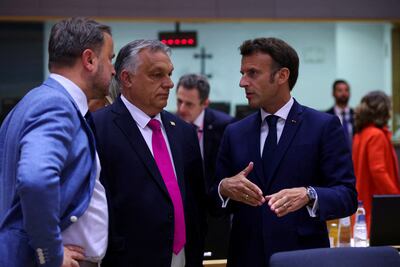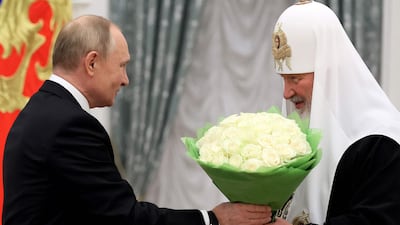Live updates: follow the latest news on Russia-Ukraine
The European Union signed off a sixth sanctions package against Russia on Thursday that will ban the majority of oil imports, after a late objection from Hungary had threatened to further delay the embargo.
Diplomats approved legislation giving effect to the oil ban agreed on Monday, when a late-night compromise with Hungary exempted a vital pipeline from the embargo.
But the formalities took longer than expected after Hungary said it could not support sanctions against religious leader and Kremlin ally Patriarch Kirill of Moscow, who has defended the invasion of Ukraine.
The EU's 27 countries eventually agreed to drop the patriarch from the list, but there was frustration from neighbours at Hungary's tactics.
Lithuanian delegate Arnoldas Pranckevicius said it was "very disappointing and hardly acceptable" to raise a last-ditch objection after Monday's deal appeared to have ended the impasse over the package.
"Anyone who engages with Orban's methods once will keep on getting extorted," said Norbert Roettgen, the head of the German parliament's defence committee.
Hungarian Prime Minister Viktor Orban's office said his position on sanctioning the patriarch had "long been well known" and that no EU leader had objected to it during the two-day summit in Brussels this week.
France, which holds the EU's rotating presidency, said the final text "significantly extends sanctions against Russia", removing three more banks from payments system Swift and sanctioning military figures, oligarchs and propagandists, as well as banning many oil imports.
But the weeks-long impasse frustrated Ukraine's President Volodymyr Zelenskyy, who wants a total ban on oil and gas imports. EU leaders have said a gas embargo is not on the cards after the struggle to get a deal on oil.
The embargo covers only oil shipments by sea, which account for about two-thirds of Europe's imports from Russia, EU officials say. It is hoped that imports will actually fall by as much as 90 per cent because of assurances by Germany and Poland that they will not make use of the pipeline exemption.
Mr Orban also won guarantees that he could source oil from his neighbours if the Druzhba pipeline that carries Russian crude to Hungary via Ukraine is disrupted. Sanctions require unanimity in the EU, meaning a single country effectively has a veto until its demands are met.

Mr Orban, who positions himself as a defender of Christian values in Europe, has previously said Hungary would oppose the inclusion of any church leaders on the sanctions list.
Patriarch Kirill is in the line of fire because of his staunch support for Russian President Vladimir Putin, who ordered the invasion of Ukraine on February 24.
Although some Russian Orthodox clergy members have spoken out against the war, the patriarch has stood by Mr Putin and given what the US has described as "supposed religious justification" for the war.
In an interview in May, the patriarch echoed many of Mr Putin's talking points by complaining about Nato expansion and describing attacks on Russian speakers in Ukraine by supposed neo-Nazis.
After Mr Orban won a Hungarian election in May, the patriarch sent him a message hailing him as "one of the few European politicians" standing up for Christian values.
Mr Orban has long been regarded as the Kremlin's closest ally within the EU and has crossed swords with the bloc's leaders over what they see as the erosion of democratic standards in Hungary.
The EU's foreign policy chief Josep Borrell on Tuesday said he was not sure whether the patriarch's name would make the sanctions list after it had initially been included.
More than 1,000 people have had sanctions imposed by the EU, meaning their assets in Europe are frozen and their travel is restricted because of the conflict in Ukraine.
They include Mr Putin himself, Russian Foreign Minister Sergey Lavrov, other senior politicians and oligarchs including former Chelsea Football Club owner Roman Abramovich.


